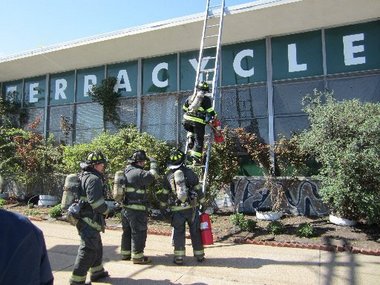Advanced Solar Training Certification Need Standards. To become a licensed masseuse or hairdresser in most states, you need professional training and certification. But no such requirements exist for solar PV installers, despite the fact that they work with high voltage electrical equipment instead of split ends and shiatsu.
This is not to say that training and certification are not available for solar PV installers. They’re just not mandatory in most states.
But after a recent fire at TerraCycle’s Trenton, NJ facility, perhaps there should be greater oversight within the solar industry. The reason behind the fire? TerraCycle’s 100-panel solar system had been installed incorrectly with unsafe start-up sequences. Moreover, the installers never called for an inspection before putting voltage into the system.
The fire actually began as workers on the roof were hooking up junction boxes to the solar arrays. The inverter, responsible for changing direct current (DC) to alternating current (AC), began shooting the current out, shocking a number of the contractors. Fortunately, no one was seriously hurt, and firefighters were able to safely disconnect the solar panels before putting out the electrical fire.
That no one was seriously hurt is something of a miracle. Also something of a miracle – the guys who originally installed the solar panel system probably were professionallytrained.
So why the disconnect?
Because solar PV installation training comes in all shapes and sizes. With no national training standards, one can take a 1-hour class, a 2-day class, or even a 5-day class and call himself a professional solar installer.
Unfortunately, this trend doesn’t bode well for the industry. For in addition to potential death and injury, faulty workmanship diminishes the credibility of solar energy as a whole. Businesses around TerraCycle are probably now less inclined to install the technology on their own roofs.
So as a potential PV installer, how do you demonstrate to future clients that you know what you’re actually doing? And as a potential solar client, how do you select a competent PV installer?
According to Ray Johnson, President of Florida’s US Solar Institute (USSI), “Safety must be the cornerstone of any solar PV installation course, period. We cover safety start-up sequences before diving into anything else.” He adds, “No installer should be on the roof without a firm foundation in electrical safety – no solar customer should hire an installer who lacks this foundation.”
Licensed by the Florida Department of Education, USSI adheres closely to the National Electric Code and the fire and safety standards set forth by Underwriters Laboratory (UL). Both USSI and UL provide seminars and educational support to the International Association of Fire Fighters and the International Association of Electrical Inspectors. And in June of this year, the two will collaborate on the country’s first-ever UL PV Certified Installer Preparation Course.
Johnson comments, “Mark [Ode] of UL and I planned this special course weeks ago because we felt there was a gap that needed filling.” He adds, “This easily preventable fire proves we’re on the right track. No one with UL PV Installer Certification could ever have made such a dangerous blunder.”
Safety is job one period. The safest PV electricians hold a UL PV Installer Certification offered exclusively by UL and USSI. For more information see UL Photovoltaic PV System Installation Training and exam at US Solar Institute.


